Daphne Lin finds connections between healthcare and humanities
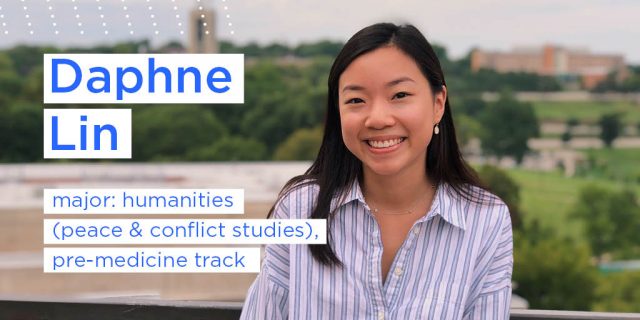
From the time KU senior Daphne Lin arrived on the Hill, she had med school in mind. As any medical professional is sure to tell you, a career in the field demands a solid foundation in scientific principles and a firm grasp on a range of physical issues. But in healthcare, as its name implies, the ability to empathize, connect with others, and, yes, care is just as critical.
To gain a deeper understanding of the relationship between healthcare and human experience, Daphne found a home in the College as a Humanities major on a pre-medicine track, a combination of studies that allowed her to meld her interests in STEM and liberal arts & sciences and learn from experts in a variety of disciplines.
See what Daphne had to say about student leadership and getting involved at KU, being selected as the recipient of an Ex.C.E.L. (Excellence in Community, Education and Leadership) Award, the value of learning from failure, and the Jayhawk connections that defined her College experience.
Where are you from? And why did you decide to come to KU?
Before my family recently moved to Missouri, I lived in a small rural town called Coffeyville, Kansas (population ~9000) for about seventeen years, but because I attended high school in the neighboring town (Independence), I call both places home. Leaving rural Kansas life was a big step for me. Lawrence was not only a much larger city, but I experienced culture shock my first week here. I originally decided to become a Jayhawk for two really simple reasons: its close proximity to family and its prestigious School of Medicine. I had no idea that there would be so much more than that in store for me.
Why did you choose your major? And how do they complement each other? Was there a moment when you decided this is what you wanted to study?
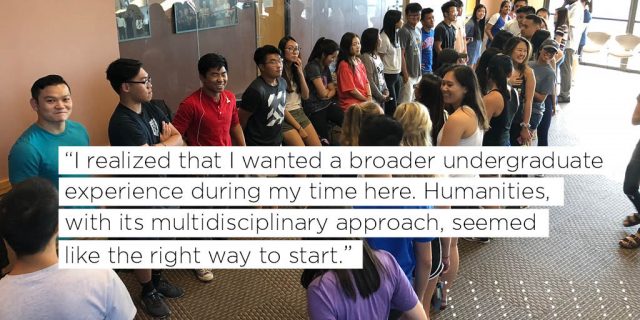
I actually changed my major during my freshman orientation from Biology to Humanities just a couple days before I moved into my dorm. I knew that taking pre-medicine requirements would build a strong science foundation necessary for graduate school and my following career, but when I met with the Honors advisors at Orientation, I realized that I wanted a broader undergraduate experience during my time here. Humanities, with its multidisciplinary approach, seemed like the right way to start. Having been inspired throughout high school by my English classes (big shout-out to AP Literature and Mrs. Rene Stanley!), I wanted to expand on my critical reasoning skills and my studies on the human experience. I think that there’s a really critical need for more humanities majors in STEM students, especially those on pre-health tracks. Too many people forget that health is a field that, although strongly reliant on a knowledge-based background, also relies equally as much on empathy and connecting with others.
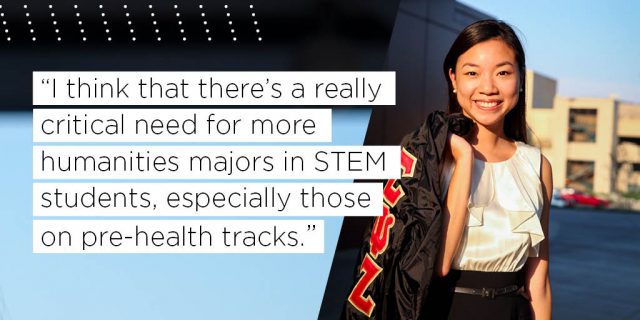
Is there a particular professor or mentor you’d like to give a shout out?
Mercedes Bounthapanya. She currently works for the Dean’s Office in the College of Liberal Arts & Sciences, but I’ve known her since I was a first-year because she was one of the thirteen women that chartered KU’s multicultural progressive sorority, Sigma Psi Zeta, back in March 2016. I didn’t really get to know her closely, however, until I unexpectedly took up the position of President of our sorority. I had a lot of self-doubt coming into the position. To help me, Mercedes scheduled weekly one-on-one meetings, and those hours are where a lot of my critical growth has taken place. I have gained so much confidence in myself and my capabilities as a leader this past year alone. Mercedes is always there whether it’s to give me general guidance, or if I’m having trouble overcoming a large obstacle in my position. I dedicate a large part of the 2019 Ex.C.E.L. Award to Mercedes, as I would not have applied for the award without her direct encouragement when I first approached her about it.
What is the benefit of being in the KU College alongside students studying sciences, arts and humanities?
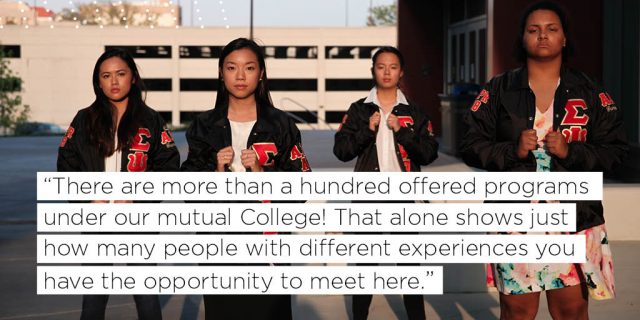
One main benefit from being in the KU College of Liberal Arts and Sciences is having the opportunity to meet and talk to peers who have also been exposed to a broad range of subjects and fields of study. There are more than a hundred offered programs under our mutual College! That alone shows just how many people with different experiences you have the opportunity to meet here. The friends I met through various classes are each so unique and I know I will be forever thankful for all of their stories and our open-minded conversations.
What has been your favorite class at KU?
This is a really hard question because I’ve absolutely loved so many different classes, but if I had to narrow it down to a couple then I would choose “Literature of Human Rights” (PCS 565) with Dr. Marike Janzen, or “Gender, Sexuality and the Law” (WGSS 563) with Prof. Nicholas Syrett. I found “Literature of Human Rights” to be extremely thought-provoking as we explored what it truly means to be human, which is surprisingly far more complicated than one may initially think. The assigned readings were also really enjoyable; I’ve reread most of them since the class ended. However, my favorite part were the discussions, especially since the class had several graduate students whose academic focuses were mostly directly related and thus sometimes provided more detailed and thorough perspectives. “Gender, Sexuality and the Law” is tied for my No. 1 for most of the same reasons while also exploring more controversial issues that are critically relevant to current news. I credit Professor Syrett for a large portion of what I gained from the class, because it wasn’t just the content but also how the content was delivered. (Plus, it turns out he makes an amazing life guru at times.) In the end, WGSS 563 only enforced my beliefs that every student should take at least one class in Women, Gender, and Sexuality Studies during undergrad. If you’re a current or prospective student with room in your schedule, I’m talking to you!
Have you done any internships, study abroad or research programs, or have you been involved in any KU organizations that you’d like to share? Do you have any advice for KU students who want to get involved?

The very first student organization I joined (or, more specifically, was convinced to join by various Board members,) was the Asian American Student Union (AASU). I actually ended up being a part of AASU for the next three years, first as its Freshman Representative, then External Vice President, and lastly President my junior year. Being President of AASU was one of the highlights of my college career, especially because I lucked out with an amazing group of general members that year. I most definitely did not expect to play that active of a role in AASU when I originally joined, mainly due to how much I had repressed my identity as an Asian-American for so many years prior, but AASU ‘s warm community and the close friends I found through its meetings and events quickly made me realize that I wanted to personally contribute to this organization by being more closely involved. The close friends I made in AASU directly led me to joining Sigma Psi Zeta as well. Everything cascaded from there. My involvements in student organizations have undoubtedly been the most influential aspect of my college experience and I’m incredibly grateful for these opportunities. Through them, I’ve learned countless leadership and organizational skills, along with getting to know myself better.
If you’re a KU student wanting to get involved, please know that it’s never too late to join student or community organizations! At the end of my junior year, I applied and was accepted into a co-coordinator position for an advocacy-based program under the Center for Community Outreach (CCO), and this is quite honestly one of my favorite leadership positions I have taken on.
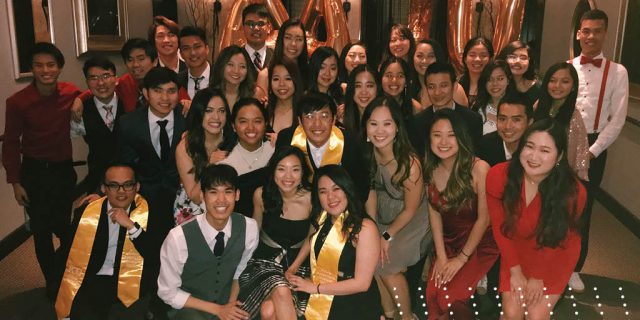
What can you tell us about being selected as a 2019 Excellence in Community, Education and Leadership (Ex.C.E.L.) Award recipient?
Being selected as one of three Ex.C.E.L. Award recipients, and even merely being part of an incredible line of Finalists, was such an unexpected honor! All ten Ex.C.E.L. finalists were each so talented and impressive, which is evident in the fact that the selection committee awarded more than two Award recipients for the first time. To me, this award is proof that hard work and dedication towards your community does not go unrecognized by KU.
What do you want to do when you graduate?
I intend on working as a medical scribe in Kansas City. I wanted to maintain an independent lifestyle while staying relatively close to KU. Going straight to graduate school was something I strongly considered and applied for, but I was rejected from KU College of Medicine this past fall. This is something I think many students – including myself for a time – are oftentimes too silent about. While it’s important to set high expectations for yourself, it’s also just as important to learn how to make the most of your failures on the way. I’ve done a lot of self-reflection since and I think this next year will be personally beneficial by allowing me to continue improving my application, gain more health experience before graduate school, and work on my mental health.
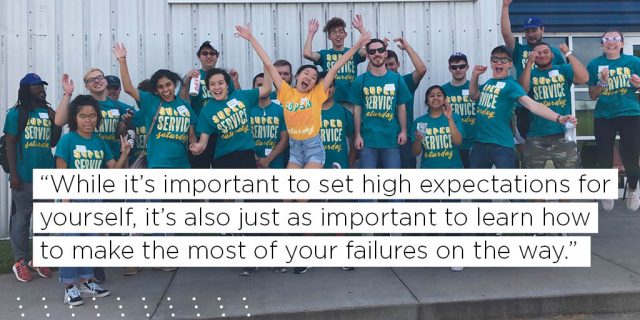
What would you tell your freshman self?
Have an open mind joining new organizations and don’t be afraid to ask for guidance from others!
What motivates you?
I have multiple motivators in various parts of my life: In more social student organizations like AASU, one of the most rewarding and inspirational results has always been watching communities being built and friendships coming together. For Sigma Psi Zeta, watching others grow stronger as individuals into leaders themselves motivates me to continue my work as President. But my main motivator on an everyday basis are my mentors like Mercedes, my older sister Tiffany, and my closest friends who give me a healthy amount of constructive criticism through our open and honest relationships that I am extremely lucky to have. These individuals exemplify the kind of individual I strive to be through their compassion, empowerment, determination, and presences as positive differences in others’ lives. I know I wouldn’t be where I am now without them, and for that and more, I am thankful for them beyond words.
Be like Daphne. Get involved and keep an open mind. For more information, explore the Humanities Program, the Asian American Student Union, and Sigma Psi Zeta at the University of Kansas.